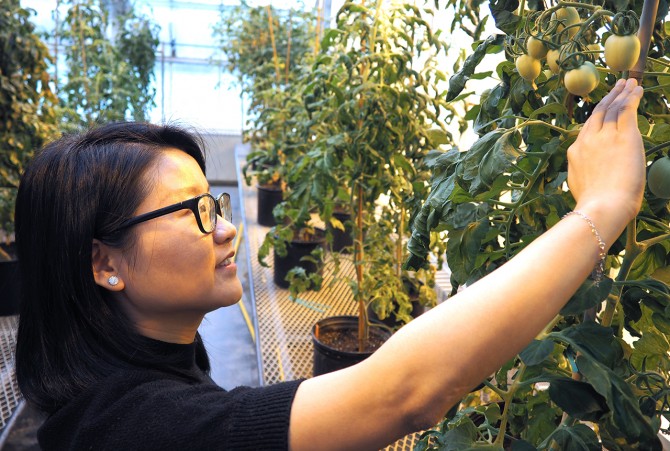New BTI database to foster efficiency, collaborations
By Aaron J. Bouchie
Recently developed gene editing tools like CRISPR/Cas enable plant scientists to figure out the functions of myriad plant genes. While these studies could eventually lead to the creation of crops with improved traits, such as increased disease resistance or higher yield, researchers first need a good way to keep track of the increasingly large amount of resulting data.
To meet this need, researchers at the Boyce Thompson Institute (BTI) have developed the Plant Genome Editing Database (PGED), a central repository for efficiently managing plant mutant data and a platform for sharing the data and mutants with the research community. The ultimate hope is that PGED will lead to more efficient use of resources by reducing unnecessary duplicate experiments and catalyzing collaborations among research institutions.
The researchers published a call for data submission to PGED Jan. 10 in the journal Molecular Plant. Corresponding authors are Gregory Martin, professor in the Plant Pathology and Plant-Microbe Biology Section of the School of Integrative Plant Science (SIPS), and Zhangjun Fei, associate professor in SIPS. Both are BTI faculty.
“We’ve used CRISPR/Cas to make more than 430 different varieties, and that’s just in tomato,” Martin said. “The main problem initially was how to keep track of them all, so that was the primary motivation behind the creation of the database. Many plant biology labs are doing CRISPR/Cas research these days, and everyone is going to face this problem.”
A secondary motivation was to share data and resources, part of the mandate of the National Science Foundation, which helped fund the creation of PGED. “We’re trying to make CRISPR/Cas research more efficient,” says Martin. “The scientific community can’t afford having multiple different labs making the same mutant.”
Zach Lippman, professor and Howard Hughes Medical Institute investigator at Cold Spring Harbor Laboratory on Long Island, agrees with Martin. “You can just go to the database, see that someone else is working on what you’re interested in, and ask them for seeds,” said Lippman, whose lab works with CRISPR/Cas in tomato, groundcherry, peppers and other related species.
Thus far, seven research groups have requested seeds from Martin, and his lab has shared 21 plant mutants with five labs. Martin notes that many of the requests have been for collaborations, and that is where he sees great potential for PGED. “We’ll be sending seeds, and the partners will be doing their research and then sending their seeds back to us for further study,” he said. “This database will promote collaborations around the world.”
Indeed, Lippman has requested seeds from Martin for exactly such a partnership. “We work on receptor genes in the context of plant development, whereas Greg works on some of the same ones to study plant immune response,” Lippman said. “We can share seeds to see if there may be some cross-biology in the function of those receptors in terms of plant immune responses and overall development.”
PGED currently contains data generated by Martin’s lab on 432 tomato lines created with CRISPR/Cas editing by Ning Zhang, a postdoctoral scientist in Martin’s lab. The database – which was built by Yi Zheng, a postdoctoral scientist in Fei’s lab – provides information about the transformation experiment, species variety, DNA construct and primer, resulting phenotype of the progeny and seed availability.
Zhang and Zheng are co-first authors on the Molecular Plant publication.
Aaron J. Bouchie is a science writer at the Boyce Thompson Institute.
Media Contact
Get Cornell news delivered right to your inbox.
Subscribe

